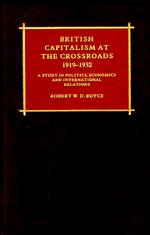 British Capitalism at the Crossroads, 1919–1932
British Capitalism at the Crossroads, 1919–1932 Book contents
- Frontmatter
- Contents
- Preface
- List of abbreviations
- Introduction
- 1 THE POLITICS OF ECONOMIC INTERNATIONALISM
- 2 CRUCIFIED ON A CROSS OF GOLD
- 3 ‘NORMALCY’
- 4 CONFLICT OVER COMMERCE
- 5 THE SCRAMBLE FOR GOLD
- 6 THE SECOND LABOUR GOVERNMENT AT THE HAGUE
- 7 FREE TRADE: THE LAST OFFENSIVE
- 8 THE CHALLENGE OF REGIONALISM
- 9 THE GOLD STANDARD UNDERMINED
- 10 THE AUSTRO-GERMAN CUSTOMS UNION CRISIS
- 11 THE COLLAPSE OF ECONOMIC INTERNATIONALISM
- Conclusion
- Notes
- Bibliography
- Index
- Frontmatter
- Contents
- Preface
- List of abbreviations
- Introduction
- 1 THE POLITICS OF ECONOMIC INTERNATIONALISM
- 2 CRUCIFIED ON A CROSS OF GOLD
- 3 ‘NORMALCY’
- 4 CONFLICT OVER COMMERCE
- 5 THE SCRAMBLE FOR GOLD
- 6 THE SECOND LABOUR GOVERNMENT AT THE HAGUE
- 7 FREE TRADE: THE LAST OFFENSIVE
- 8 THE CHALLENGE OF REGIONALISM
- 9 THE GOLD STANDARD UNDERMINED
- 10 THE AUSTRO-GERMAN CUSTOMS UNION CRISIS
- 11 THE COLLAPSE OF ECONOMIC INTERNATIONALISM
- Conclusion
- Notes
- Bibliography
- Index
Summary
Following the armistice in 1918 the British government took a series of decisions that reversed the wartime trend towards state regulation of the economy, protectionism, and Empire preference, and restored the country to its pre-war posture of economic internationalism. The decisions were taken swiftly and with little debate amidst the tumult of postwar events, but their consequences were tremendous. In the first place, the country's prosperity was made to depend vitally upon the reconstruction of the international trade and payments system. Secondly, domestic industry was again almost fully exposed to the strains of world leadership. Britain's contribution to postwar economic reconstruction, although obscured by the emphasis in recent accounts upon the contribution of private American interests, was indeed impressive. But so too was the burden it placed upon the domestic economy and the opposition to economic internationalism that this eventually raised.
In the immediate postwar period public sentiment leaned strongly towards a general retour en avant. Domestic industry and labour, which were forced to shoulder the main burden of adjustment, were as yet poorly organised, and the war offered a convenient explanation for the difficulties they experienced. The return to the gold standard at the prewar parity of $4.86 in 1925 appeared briefly to re-establish disciplined control over the British economic system. But the immediate result in Britain was further deflation and acute industrial strife. In the meantime, shifts in industrial priorities and stiff overseas competition were making industrialists and trade unionists increasingly reluctant to accept the gold standard, free trade, and other internationalist policies.
- Type
- Chapter
- Information
- British Capitalism at the Crossroads, 1919–1932A Study in Politics, Economics, and International Relations, pp. 1 - 4Publisher: Cambridge University PressPrint publication year: 1988


